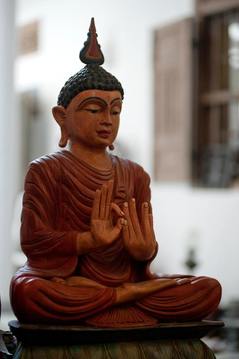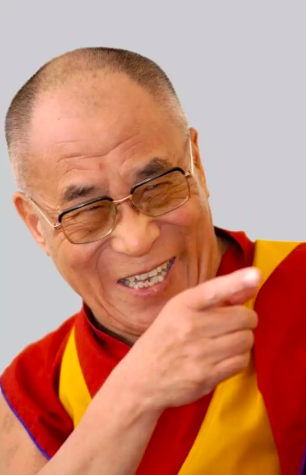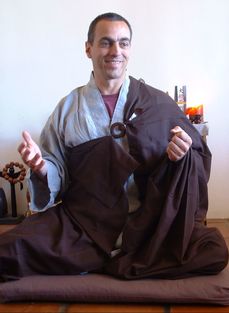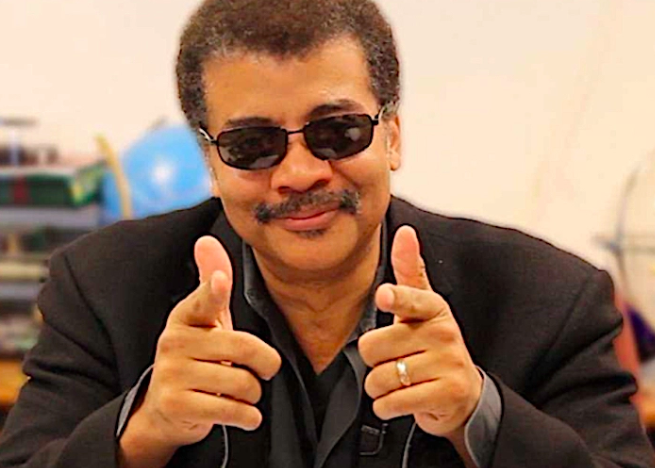 A story told by the Buddha as a warning to not cling to what we believe, but to keep an open mind and to follow the evidence has great relevance for us living at a time when opinion and ideology often "Trump" the facts. The Buddha told a story to his students: “A young widower was devoted to his little son. But while he was away on business, the whole village was burned to the ground by bandits, who also kidnapped the little boy. When the father returned and found only ruins, he was utterly heartbroken. He thought that the charred remains of a little child were of his son, so he organized a full cremation, collected the ashes, and carried them with him always in a special bag. One day, his son managed to escape from the bandit kidnappers and made his way back to his home. In the meantime, his father had rebuilt the house. When the little boy arrived late one night, he knocked on the door. His father, kneeling at the altar he had made to memorialize his son called out, “Who’s there?” “It’s me, your son; please papa, let me in!” The father, still burdened by his grief thought this must be some wretched boy making fun of his grieving and shouted out, “Go away! Leave me alone! My son is dead!” The boy knocked again and again, calling for his father to open the door and let him in. The father, refusing to answer the door kept calling out, “Go away! Leave me alone!” And at last, the boy gave up and went away, never to return again. After he had told this story, the Buddha added: “If you cling to an idea as the unalterable truth, then when the truth comes and knocks on your door, you will not be able to open the door and accept it.” ---Udana Sutta The first time I heard this story was when Thich Nhat Hanh shared it at a retreat in 1993 at Omega and it had a profound effect on me. Perhaps ironically, and not how Thay may have intended it, this story has led me to deeply question and ultimately reject some of the dogmatic doctrines of Buddhism (such as literal rebirth and the traditional understanding of karma), to eventually leave the Communities of Mindfulness established in the tradition of Thich Nhat Hanh, and to create a path of zen practice I call Zen Naturalism, honoring skepticism, and critical thinking. It is a path committed to “following the evidence” from the best scientific research, based upon scientific consensus no matter where it leads. Even if it leads to positions contrary to those I might prefer based upon my emotional feelings and desired conceptual framework, I am committed to accept the evidence. And, crucially, to also be willing to change my belief stance once again if new information demands it.  Now, some would say that this is no different from the Dalai Lama who has repeatedly said that if scientific research offers knowledge at odds with Buddhist teachings then Buddhism must change and the science be accepted, I need to point out that the Dalai Lama has an astute understanding of science. He’s willing to accept science when it comes to cosmology, but as it’s impossible to prove with any certainty whether rebirth is literal or not he’s safe in holding to that doctrine – even though as of now the consensus, based upon the best evidence, is that consciousness cannot survive the death of the brain. The buddha comments on the morale of the story by saying “If you cling to an idea as the unalterable truth, then when the truth comes and knocks on your door, you will not be able to open the door and accept it.” But isn’t this just what most religionists do? They cling to notions and ideas as “unalterable truth,” the “verities” of their particular dogma, what they deem as “Eternal Truth,” and always with a capital “T”. Think of the Christian Right which denies the truth of evolution and an old earth. Despite the preponderance of evidence for earth being much older than 6,000 years, such believers remain recalcitrant in holding onto their beliefs. Also, despite the evidence that it’s not flat, there is a growing (?!) number of ‘flat earthers’ out there! It is only the scientific mind that accepts and celebrates the understanding that as humans, we can only arrive at provisional truths (definitely lower case) and that we need to be willing to question all beliefs, understandings, and knowledge with the concomitant willingness to change one’s mind when the evidence warrants it. And how difficult it is to change one’s mind. And how interesting that science – in this case neuro- and cognitive science – can even explain why it might be so difficult to change one’s mind. This story shared by the buddha could not be more relevant given the slippery hold on truth evidenced by the current administration. For instance, Trump and his White House continue to harp on the notion that undocumented immigrants are responsible for a veritable crime wave and frequently exaggerates and makes up stories about MS-13 which is a gang that originated in Los Angeles. But the overwhelming social science research and consensus is clear: undocumented immigrants are considerably less likely to commit crime than native-born citizens, and with immigrants legally in the US even less likely to do so! There’s the lie Trump continues to repeat about rampant voter fraud when The Brennan Center for Justice at NYU points out that “study after study has shown voter fraud is vanishingly rare, and voter impersonation is nearly non-existent.” Among other lies he repeats is that anything remotely critical of him is “fake news” despite there being evidence to the contrary, but really none of this should surprise anyone when he lied – in the face of photos showing the contrary – that the turn out for his inauguration was the largest of all time! Perhaps the most potentially destructive clinging to an idea is the right-wing rejection of all the evidence for climate change. With even NASA speaking out about the scientific consensus regarding human-caused global warming, the GOP refuses to accept the evidence and moves to increase the use of coal and oil rather than the more economically astute alternatives. That’s how strong denial can be; that capitalists cling to a form of energy despite the potential economic benefits of alternatives! But before any liberals get all pontifical and self-congratulatory, it’s not just the right-wing that denies science when the evidence refutes their ideology and firmly held beliefs. If you cherry-pick which scientific evidence and consensus to accept, you may not be a 'science denier,' but neither are you a science supporter; you are an ideologue. Consider the number of liberals who remain anti-vaccination despite the overwhelming evidence and consensus regarding their life-saving benefits and that immunization is heralded as the greatest, most important single innovation of the 20th century. Again, a mountain of evidence against closely held ideological belief and many remain adamant in clinging to their belief.  Typical scare image showing lack of any scientific understanding. . Typical scare image showing lack of any scientific understanding. . Another belief clung to religiously (and make no mistake, such clinging in the face of the evidence is a religious orientation of faith as opposed to a scientific orientation willing to change position in line with evidence) is that GMOs are “dangerous.” What is the scientific consensus about genetically modified organisms? The National Academies of Science, Engineering and Medicine compiled the most far-reaching report ever produced by the scientific community on genetically engineered food and crops. The conclusion? Unambiguous: Having examined hundreds of scientific papers, sat through hours of live testimony from activists and considered hundreds of comments from the general public, the scientists wrote that they “found no substantiated evidence that foods from GE crops were less safe than foods from non-GE crops.” Now, I can go on with other examples of things people – especially in the yoga/buddhist communities that tend to be heavily influenced by new age thinking – believe against all evidence such as astrology, homeopathy and so-called ‘energy healing modalities’ like therapeutic touch but I’ll only touch upon one persistent myth that I find fascinating in how it reveals a very common cognitive error: confirmation bias. Countless reliable studies comparing the lunar phases to births, heart attacks, deaths, suicides, violence, psychiatric hospital admissions and epileptic seizures, among other things, have over and over again found little or no connection, yet the “lunar effect” continues to be held to by many – especially first responders and emergency room nurses and doctors. Why? Well, if it’s a hectic night and someone says, “Must be a full moon” and you go outside and check and lo, it’s a full moon, that will have a huge impact and will not soon be forgotten. However, if you go check and it’s not a full moon, it will not be noted as special and all the times it wasn’t a full moon won’t be remembered because it doesn’t make an impact. It’s the same thing with thinking of someone and then the phone rings and it’s them. Wow! A real psychic connection, right? Well, how many times have you thought of that person and they didn’t call? So, Zen Naturalism is a form of Zen Buddhism that practices the traditional practices, re-interprets some of the traditional teachings and critically rejects the teachings that support faith-based belief not grounded in scientific evidence. All of its currently held positions (a term I prefer over belief) are open to change or rejection if future evidence warrants it. I may be legitimately questioned as to why I accept scientific evidence over the testimony of yogis that rebirth is real or karma is an ontological fact, or that there are other immaterial beings and realms that they have accessed? First, by definition, the acceptance of any such immaterial realms is the dualistic philosophy that a supernatural realm (or realms) exist. As natural beings, we have no access to such realms even if they exist. If it’s claimed that we humans too are dual creatures having an immaterial soul (something the buddha seemed to reject, by the way) that has to be admitted to be a faith-based belief as no one has any real proof of its existence. If that’s your choice to believe in a soul, I’ve no argument with you if you admit it’s simply a personal preference to believe that as an article of faith. Again, as far as I can tell from the scientific evidence, the so-called ‘spiritual’ experiences I’ve had through practice, experiences that super-naturalists believe is evidence for the supernatural can be explained naturalistically. Such experiences have meant and continue to mean much to me, but I do not feel the need to claim that they point to any ontological existent. Because they are the product of natural brain processes doesn’t make them less significant to me. I choose science as the way to knowledge about what exists because it works. It’s proven itself over and over. I’ve read the major religious texts from the Bible to the Koran, from the Tao De Ching to the Upanishads and more and they are replete with contradictions and obvious falsities. Imagine someone saying, “Take our airplane, we fly according to alternative aerodynamics.” Would you honestly trust that? As a way of knowledge, it uniquely provides objective evidence about what is, what isn’t and – to a very large extent – what cannot be. I am not denying other forms of knowledge, but unlike art, philosophy or religion, science is based upon empirical research which depends upon systematic observation and experimentation, not opinions, feelings and intuitions (though intuition can guide the creation of a hypothesis and experiment). Observation and experiment leads to results that must meet two criteria: validity which means that the research and experiment is actually relevant to the question being tested; and reliability which means it must be repeatable and consistent which is evidenced itself by other scientists being able to perform the same experiments under the same conditions while obtaining the same or similar results. I choose science because it works.  Hapchang, Poep Sa Frank Jude
2 Comments
bob neylan
7/20/2020 12:46:24 pm
Thanks for the article. I found it illuminating and thought-provoking, as much of your writing and teaching often is and has been over the years. Peace, Shinrai
Reply
7/20/2020 02:59:35 pm
Thanks, Shinrai!
Reply
Leave a Reply. |
AuthorPoepsa Frank Jude Boccio is a yoga teacher and zen buddhist dharma teacher living in Tucson, AZ. Categories |

 RSS Feed
RSS Feed